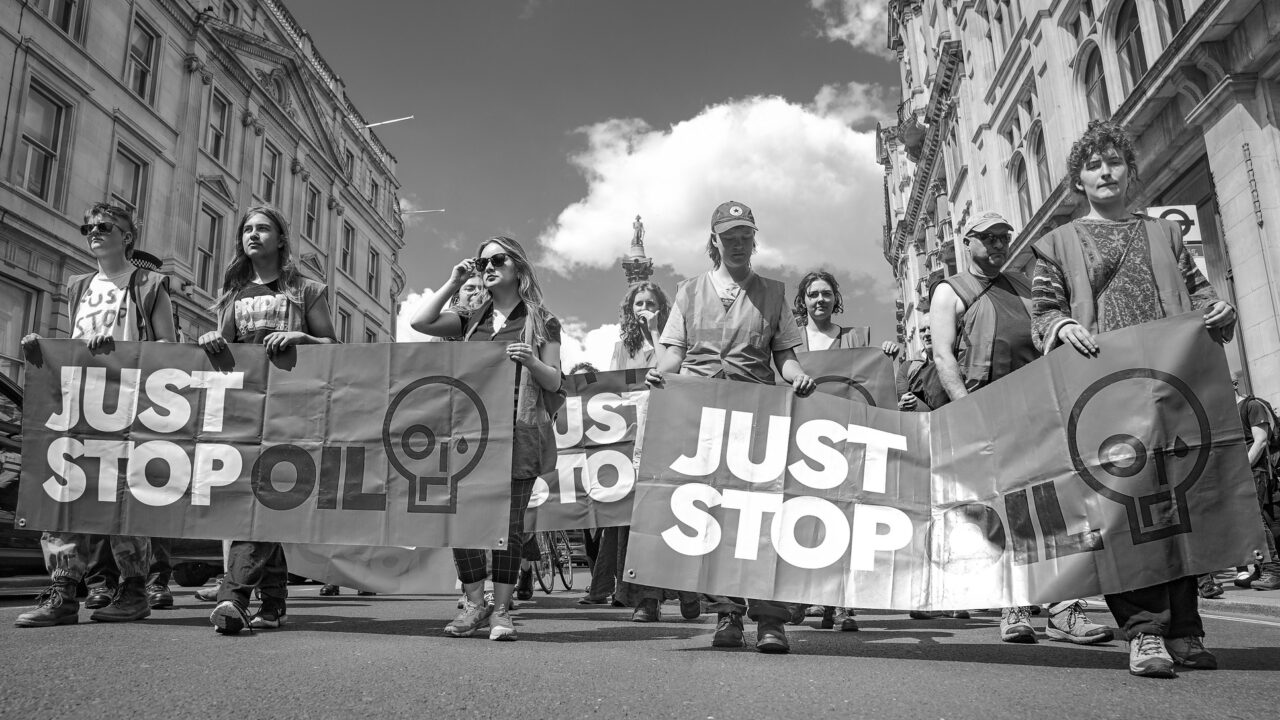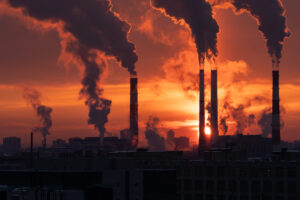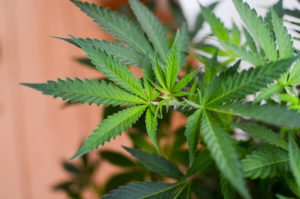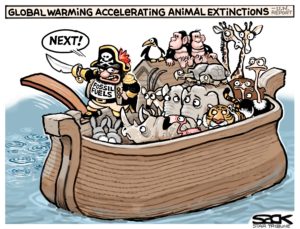In Search of Climate Politics’ Radical Center
Statistics and arguments alone cannot power the climate struggle—hope is what sways hearts. Just Stop Oil activists marching down Whitehall by Flickr / CC BY-SA 3.0
Just Stop Oil activists marching down Whitehall by Flickr / CC BY-SA 3.0
If the climate movement has taught us anything over the past decades, it’s that although it’s necessary to communicate the symptoms of the planetary crisis, such as atmospheric CO2 levels or global income inequality, statistics rarely sway hearts unless they are tied to compelling storytelling of a better future. There are many reasons why stories catalyze change. Here’s one: we all need a compelling reason to let go of the familiar and embrace the unknown. To address the interconnected crises afflicting our planet today — crises of climate, biodiversity, democracy, technology — we need visions for the future that are tangible enough to inspire us to reshape the way we look at the world. And for these visions to gather traction, their reach must stretch beyond their cultural, political, and class bubbles.
If climate doomism remains so appealing today, it’s in part because we don’t speak enough about all that we have to gain: about clean air, waters to swim in, farms that nourish us and the ecosystem, more free time, and healthier, more meaningful lives. It’s also because the visions of the future that receive the most air time — those of politicians and business — are focused on narrow audiences. They rarely have the courage to reach across the divide.
The environmentalist-rancher Bill MacDonald coined the term “radical center” to describe the coalition of ranchers, environmentalists, and government agencies that worked together beginning in the 90s to preserve rural livelihoods and local ecosystems in southern New Mexico and Arizona. This work of creating working partnerships that put aside their differences for a common good takes time. A decade ago, psychedelics were taboo in the US mainstream because of their association with hard drugs and the radical politics of the 1960s. In 2013, the Multidisciplinary Association for Psychedelic Studies (MAPS) started the long and arduous process of gaining FDA approval for MDMA assisted psychotherapy. Their initial work focused on treatment for US war veterans, firefighters, and police officers with PTSD. In the press conversations that followed, conservatives staunchly opposed to drugs were given a reason to change their minds when they saw their own cultural icons tell their stories of healing. MAPS has been crucial in shifting the tide of public opinion around psychedelics.
To cultivate the radical center and build consensus around climate initiatives, we need to speak to the values of our audience.
To cultivate the radical center and build consensus around climate initiatives, we need to speak to the values of our audience. Like MAPS’s work with veterans, we can speak to core values that animate human beings across the cultural spectrum. The climate scientist Katharine Hayhoe, for example, is also an evangelical Christian; much of her work involves forging alliances between Christian groups and climate advocates based on the shared values of stewarding the planet. We need this sort of diplomacy that makes it worth it for others to join the conversations we need to have. In the words of marine scientist Ayana Elizabeth Johnson,
“Show me this is worth the effort. Show me examples of where this is already happening. Show me that there’s a place for me in the future, after all this change.”
Show me there’s a place for me in the future. I’ve often asked myself whether we really need to do this, whether nurturing popular support for system change matters. Doesn’t most change happen from the top-down, or through a small elite of change-makers? Why go through the trouble of rallying “the masses”? These are valid questions: a recent Harvard study confirms that only 3.5% of a population protesting nonviolently is necessary for serious political change. But this perspective is akin to being in a theater, focusing on the brightly lit actors on the stage, and forgetting about all that is happening backstage and beyond that enables the performance. The activist and author Rebecca Solnit describes this process, using the example of the US Supreme Court’s 2003 ruling that struck down the last laws criminalizing homosexuality:
The conventional narrative would have it that the power rests in the hands of the nine robed ones; a more radical model would mention the gay Texas couple who chose to turn their lives inside out over many years to press the lawsuit; but a sort of cultural ecology would measure what made the nation rethink its homophobia, creating the societal change that the Supreme Court only assented to: they all count.
Show me there’s a place for me in the future. The words ring in my mind as I watch videos of the UK’s Just Stop Oil protestors peacefully blockading London traffic to demand the government halt all new fossil fuel licenses. The movement draws on a rich tradition of raising awareness through disruption and spectacle. I also envision a fossil-fuel free future, yet I can’t help but identify what feels like a missing piece in Just Stop Oil’s strategy. The disruption of the lives of the working class makes headlines, but does it offer a deeper collective vision of a future without oil? The movement has so far garnered neither popular support nor government action. But there is a longer-term view in which unpopular disruption is necessary to bring issues to the public limelight. So whilst inclusivity is core to any political strategy, we can also recognize its many nuances: we don’t have to bring everybody on board all the time; we can be intentional and strategic.
This power emerges from our intuitive understanding that the public is the legitimate and just bedrock on which our institutions stand.
There is, nonethless, a particular power to including a broad public in our visions. This power emerges from our intuitive understanding that the public is the legitimate and just bedrock on which our institutions stand. In the theater metaphor, the audience is powerful because they offer their precious attention to the performers. In political revolutions, there’s always a key moment when the status quo which had felt so entrenched and immutable suddenly loses its grip on us and we wake up to a totally unfamiliar landscape. We’ve all felt this in positive and negative ways in our personal lives — when we emerge from a sickness finally able to feel good again, when we wake up from a nightmare, or when we come to terms with false beliefs that had kept a relationship afloat. Collectively, we don’t control when that liberating moment of rupture comes, when the seemingly infinite power of big business and opportunistic politicians crashes; sometimes, it never comes, or it comes in a way we don’t expect. But we can always prepare for it.
Climate doomsters may critique this viewpoint as too rosy, offering a false sense of hope (“hopium”). Is it not naive to speak of system change amidst firestorms, mass extinction, and the continued, state-sponsored granting of new oil and gas leases? Have we not irreversibly overshot our planetary boundaries? Is it not simply too late? Having read enough disturbing climate statistics and seen enough destruction to throw my arms up in abandon, I empathize with this perspective. But believing in our collective capacity for positive change is not to deny how deep in crisis we are. It is instead to make an informed bet, with no certainty of winning, on a shared, thriving future in this deeply interconnected planet. We can accept the state of the world today and still agree that, in Solnit’s words,
Your support matters…“When we fight we sometimes win; and that we are deciding the future now.”
Independent journalism is under threat and overshadowed by heavily funded mainstream media.
You can help level the playing field. Become a member.
Your tax-deductible contribution keeps us digging beneath the headlines to give you thought-provoking, investigative reporting and analysis that unearths what's really happening- without compromise.
Give today to support our courageous, independent journalists.






the fools with the plastic "just stop oil" signs, plastic sunglasses, plastic shoes, plastic clothes, etc, and of course got to their "heroic" protest in their gas powered vehicles...hypocrisy, thy name is progressive...